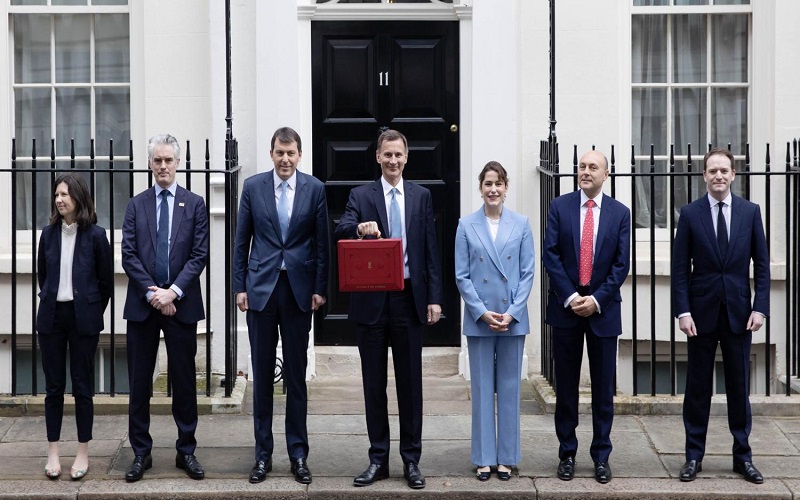Spring Budget 2023
Here’s All You Need To Know About Jeremy Hunt’s Spring Budget 2023
On Wednesday 15th March, Jeremy Hunt revealed the 2023 spring Budget in a speech to MPs at the Houses of Parliament. Since becoming Chancellor in October last year, Hunt has already reversed most of the strategies set out in the disastrous September 2022 mini-Budget. Expanding on plans set out in the autumn Budget, the new spring Budget outlines Hunt’s economic strategy which echoes his earlier desire to halve inflation, decrease debt and grow the economy.
According to the International Monetary Fund (IMF), the UK’s economy is the worst performing out of all of the G7 countries. In order to try and revitalise our economy, the Chancellor has revealed that he will implement measures to promote ‘prosperity with a purpose’.

Why is the Budget important?
The Budget presents the Government’s plans to address key areas of the economy including education, pensions and taxes. In order to independently review the country’s economic direction, the Office for Budget Responsibility (OBR) evaluates the Budget to predict the long-term economic impact.
After considering Hunt’s spring Budget, the OBR forecasts that the UK will successfully avoid recession, shrink inflation and decrease underlying debt.
What does the spring Budget set out?
For those looking to understand the highlights of the spring Budget, below is a summary of the Chancellor’s statement. You can read the Budget Report in full on the HM Treasury website.
Energy:
- Energy Price Guarantee, where annual household energy bills capped at £2500, will remain for a further 3 months until June.
- The Energy Bills Support Scheme of £67 per month paid directly to your energy supplier will continue for a further 3 months Until June.
- Charges for prepayment metres will be made comparable with customers paying via direct debit.
- £20bn investment in carbon capture technology.
- Commitment to invest in renewable energy sources so that by 2050 a quarter of the UK’s electricity is supplied by nuclear power.
Childcare:
- From April 2024, working parents with 2 year olds will have access to 15 hours of free childcare.
- From September 2024, working parents with children 9 months and over will also have access to 15 hours of free childcare.
- From September 2025, every working parent with 5 year olds and under will have access to 30 hours of free childcare per week.
- Families on Universal Credit to receive up-front childcare support of up to £951 per month for one child and £1630 for two children.
Pensions:
- The Lifetime Allowance (LTA) will be abolished from 6th April 2024. No pension savers will face the LTA charge in the 2023/24 tax year.
- Tax free cash will be limited to a quarter of the current LTA which means a maximum amount of £268,275.
- The Annual Allowance (AA) of £40,000 will rise to £60,000.
- Money Purchase Annual Allowance (MPAA) and minimum Tapered Annual Allowance (TAA) will increase from £4,000 to £10,000.
Taxes:
- 5p fuel duty cut on petrol and diesel to be extended for another year.
- Alcohol taxes in pubs will be 11p lower than the rate in supermarkets from August.
Employment:
- Returnership schemes to be offered to over 50s wanting to get back into employment.
Disability:
- Work Capability Assessment abolished.
- New voluntary employment scheme for up to 50,000 disabled people called Universal Support.
- Funding to finance Work Coaches who support disabled and long-term sick people return to work.
Businesses:
- Main rate of corporation tax will increase from 19% to 25%.
- Companies are encouraged to lower taxable profits by deducting investment in innovative new machinery and technology.
- Announcement of 12 new Investment Zones across the UK which will receive £80m funding over the next 5 years.
Defence:
- £11bn investment in defence sector over the next 5 years.
What happens next?
Immediately after the Chancellor reveals the Budget statement, MPs in the House of Commons debate the Budget Resolutions over a period of 4 days.
Any Resolutions supported by the House of Commons immediately come into effect following the debate. However, Resolutions are only lawfully enacted once Parliament presents them in a new Finance Bill at the end of the debate period.
If you would like financial planning advice after learning about the new Budget, then please contact our professional advisors at Rosewood on 01246 932300.

CONTACT DETAILS
Rosewood Wealth Management Ltd
United Kingdom (UK)
Phone: 01246 932300
Email: info@rosewoodwealth.co.uk
Registered in England and Wales Registered Company Number : 08291755. Registered address: 4th Floor, 1 Waterside Place, Basin Square, Brimington Road, Chesterfield, Derbyshire, S41 7FH.
Directors: Donna Robertson & Shannan Pool-Gorman
OPENING HOURS
What to do if you have a complaint: If you have a complaint or dispute with us, you are entitled to make a complaint. We have a complaints procedure that is available on request. If you wish to register a complaint, please contact us either in writing, by telephone or email. If you wish to register a complaint, please contact us: In writing: Shannan Pool-Gorman, 4th Floor, 1 Waterside Place, Basin Square, Brimington Road, Chesterfield, Derbyshire, S41 7FH. Email: info@rosewoodwealth.co.uk, or by telephone 01246 932300. Please be assured we treat complaints seriously. For your protection, if you cannot settle your complaint with us, you may be entitled to refer it to the Financial Ombudsman Service (‘FOS’). Please see the following link for further details: http://financial-ombudsman.org.uk/.
A lifetime mortgage is secured against your home and is a complex product. To understand the features and risks, ask for a personalised illustration. Your home or property may be repossessed if you do not keep up the repayments on your mortgage. You may have to pay an early repayment charge to your existing lender if you remortgage. The value of your investment can go down as well as up and you may not get back the full amount invested. Accessing pension benefits early may impact on levels of retirement income and your entitlement to certain means-tested benefits. Accessing pension benefits is not suitable for everyone. You should seek advice to understand your options at retirement.
© 2019 Rosewood Wealth Management | Rosewood Wealth Management is a trading style of Rosewood Wealth Management Ltd which is Authorised and Regulated by the Financial Conduct Authority – number: 841587. You can check this on the Financial Services Register by visiting the FCA’s website – or by contacting the FCA on 0800 111 6768. The Financial Conduct Authority does not regulate taxation advice, university/school fees planning some aspects of buy to let mortgages. The guidance and/or advice contained within the website is subject to the UK regulatory regime and is therefore primarily targeted at customers in the UK. The FCA’s consumer website address can be found here.